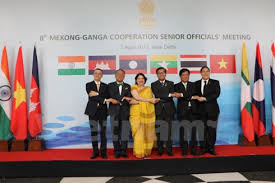On August 7, 2017, at Eighth Mekong Ganga Cooperation Ministerial Meeting in Manila, Philippines, India called for expanding the areas of cooperation among the member countries of the bloc to further deepen mutually beneficial partnership and cooperation. Minister of State for External Affairs V K Singh represented India at this meeting.
Highlights of Mr. V K Singh’s speech at Eighth Mekong Ganga Cooperation Ministerial Meeting:
India has proposed to add newer areas of cooperation to the traditional areas on tourism, culture, education, transport and communication.
- Mr Singh said, after successfully organising the International Buddhist Conclave in Varanasi in 2016, India wants to make this an annual activity.
- India is looking forward to closely working with Myanmar for developing the ‘Buddhist
 Trail’ and designate points of contact for enhancing tourism cooperation among MGC countries.
Trail’ and designate points of contact for enhancing tourism cooperation among MGC countries. - On connectivity among the MGC countries, Mr. Singh said, the concept notes on formation of task forces on maritime connectivity and extension of India-Myanmar- Thailand trilateral highway into Cambodia, Laos and Vietnam have been shared with respective countries.
- Singh also said that Nalanda University is well underway on its path towards becoming a leading academic institution focusing on Asian history and Mekong-Ganga region.
Two Projects for mapping the shared civilisational linkages of India and the other MGC Countries:
- ‘Sailing to Swarna Bhumi’: This project will chart and research maritime encounters among MGC countries as reflected in the synergetic cultures of India and South East Asia.
- ‘Mapping of Inscriptions along the Mekong’: This project is about documenting inscriptions left by Indian nobles and traders along the Mekong river, which was the main artery of cultural interaction between India and mainland South East Asia for many centuries.
About Mekong Ganga Cooperation (MGC):
The MGC is an initiative by India and five ASEAN countries, Cambodia, Laos, Myanmar, Thailand and Vietnam for cooperation in tourism, culture, education, as well as transport and communications.
- It was launched in 2000 at Vientiane, Laos.
- The initiative has been named after River Ganga and River Mekong – the large civilisational rivers in the region.





